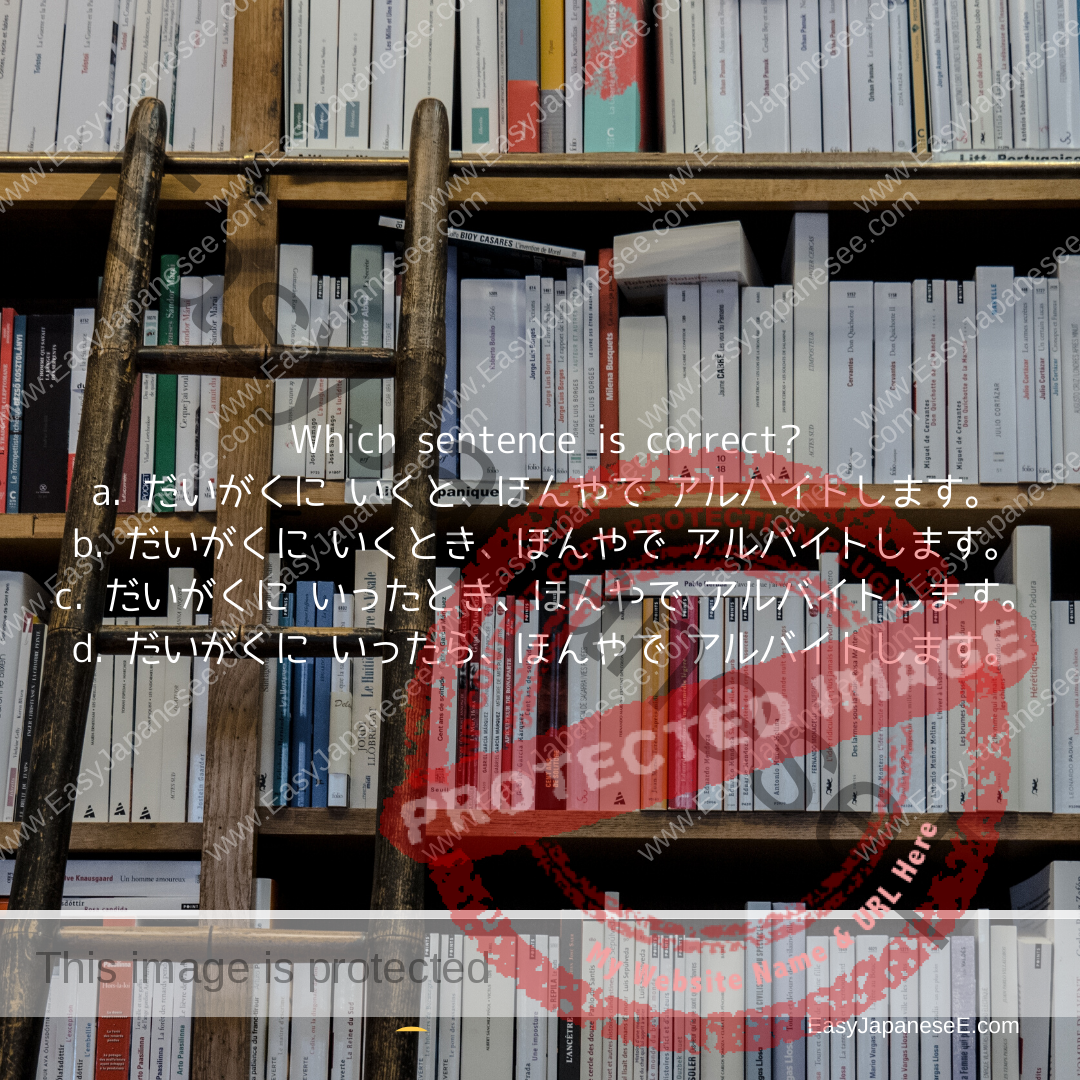When I go to university (=when I become a university student), I will get a part-time job in a bookshop.
a. だいがくに いくと、ほんやで アルバイトします。
b. だいがくに いくとき、ほんやで アルバイトします。
c. だいがくに いったとき、ほんやで アルバイトします。
d. だいがくに いったら、ほんやで アルバイトします。
All ~と, ~とき and ~たら can be used for “when ~” but their meanings are quite different and in this context, d. だいがくに いったら、ほんやで アルバイトします is the only correct choice.
d. ~たら… sets a condition: “If/When ~”
~ [past plain]+ら… is the most common way of setting a reference time point after which the event/action in the subsequent … part (should) happen(ed). I will explain a bit more in conjunction with the reasons why other choices shouldn’t be used here.
a. ~と… means “when ~, … happens automatically”
~と… is used in a sentence like:
はるが くると はなが さきます。(when spring comes, flowers bloom.)
or
この うたを きくと、そぼを おもいだします。
(When I hear this song, I always think of my grandmother ⇒This song reminds me of my grandmother.)
That is, ~と… means “after ~ happens, … (will) follow(s) automatically.” In this example, “going to university” doesn’t guarantee “getting a job in a bookshop” and/or “I” have other choices like working in a café. So ~と does not suit this context.
b. and c. ~とき… = …. at the time when ~ (it indicates a very specific occasion or window of time)
I have seen/heard many English speakers use ~とき in a similar sentence. However ~とき… specifies a relatively narrow time frame or a specific occasion when the event/action described in the subsequent part… happens/happened. So, b. だいがくに いくとき means more like “on my way to university” rather than “when I am a university student.” Similarly, c. だいがくに いったとき means “immediately after I have arrived at the university,” so it does not connect well with the second part, “I will get a part-time job in a bookshop.”
If the sentence c. was changed into the past tense,
c’. だいがくに いったとき ほんやで アルバイトを しました
is possible, but this sentence can also be used to describe a rare occasion like “one day when I went to uni, the bookshop needed somebody to help out, so I worked there for the day” rather than “I worked in a bookshop when I was a university student” for which だいがくせいの とき、ほんやで アルバイトを しました is more appropriate.
The following pairs will demonstrate the difference better:
e. だいがくに いくとき バイクに のります。
f. だいがくに いったら バイクに のります。
e. is stating a motor bike to be the mode of transport for commuting to university but f. is saying “(even though I don’t/can’t do so now,) I will ride a motorbike once I start university.”
g. ホテルについたとき、でんわしてください。
h. ホテルについたら、でんわしてください。
Both sentences are saying “Please ring me when you arrive at the hotel.” but g. has the notion of “as soon as you get to the hotel” while h. is “any time after you arrive at the hotel.” As Sentence g sounds a lot more urgent, I won’t say it unless it’s an emergency.
Some more examples of ~たら:
Note that this ~た is the generic form of the past plain verb, so sometimes it can be ~だら.
宿題(しゅくだい)をしたら、テレビを見てもいいです。
When you do your homework, you may watch TV.この薬(くすり)を飲(の)んだら、楽(らく)になりますよ。
When you take this medicine, you will feel better.ジョンさんのうちに行ったら、お母さんによろしくお伝(つた)えください。
When/If you go to John’s house, please say hello to his mother.この本を読(よ)んだら、ヨーロッパの歴史(れきし)がよくわかります。
If you read this book, you will have a better understanding of European history.テレビをつけたら、トランプ大統領(だいとうりょう)が映(うつ)っていた。
When I turned the TV on, President Tramp was in the picture.
By the way, as shown above, the word とき can be used with both a past non-past verb (like the sentences b and e) and a past verb (like c and g) and there is a small but distinct difference between the two, so if you are interested in that, please read this post.
If you have liked this article, please share it with your fellow Japanese learners. If you have a question regarding Japanese word use, please feel free to ask a question via email or a comment box below. I will not respond personally, but I will try to write a post based on your question.


One Reply to “~と vs ~とき vs ~たら”